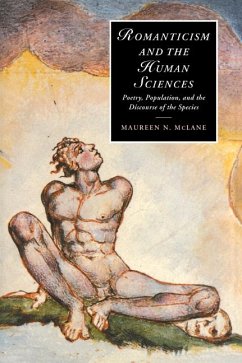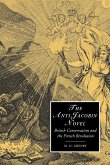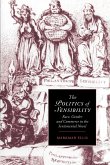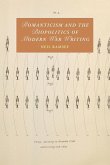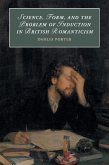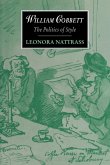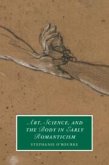Maureen N. McLane (Associate Professor, Harvard University, MassachPoetry, Population, and the Discourse of the Species
Romanticism and the Human Sciences
Poetry, Population, and the Discourse of the Species
Herausgeber: Butler, Marilyn; Chandler, James
Maureen N. McLane (Associate Professor, Harvard University, MassachPoetry, Population, and the Discourse of the Species
Romanticism and the Human Sciences
Poetry, Population, and the Discourse of the Species
Herausgeber: Butler, Marilyn; Chandler, James
- Broschiertes Buch
- Merkliste
- Auf die Merkliste
- Bewerten Bewerten
- Teilen
- Produkt teilen
- Produkterinnerung
- Produkterinnerung
This book, published in 2000, examines the relationship between British Romantic poetry and the human sciences of the period. Maureen McLane offers original readings of major works in the Romantic canon, focusing on their engagement with the philosophical, political and anthropological writing of pre-eminent theorists such as Malthus, Godwin, Burke and others.
Andere Kunden interessierten sich auch für
![The Anti-Jacobin Novel The Anti-Jacobin Novel]() M. O. Grenby (Leicester De Montfort University)The Anti-Jacobin Novel55,99 €
M. O. Grenby (Leicester De Montfort University)The Anti-Jacobin Novel55,99 €![The Politics of Sensibility The Politics of Sensibility]() Markman Ellis (Queen Mary University of London)The Politics of Sensibility43,99 €
Markman Ellis (Queen Mary University of London)The Politics of Sensibility43,99 €![Romanticism and the Biopolitics of Modern War Writing Romanticism and the Biopolitics of Modern War Writing]() Neil Ramsey (Canberra UNSW)Romanticism and the Biopolitics of Modern War Writing28,99 €
Neil Ramsey (Canberra UNSW)Romanticism and the Biopolitics of Modern War Writing28,99 €![Late Romanticism and the End of Politics Late Romanticism and the End of Politics]() John Havard (State University of New York Binghamton University)Late Romanticism and the End of Politics28,99 €
John Havard (State University of New York Binghamton University)Late Romanticism and the End of Politics28,99 €![Science, Form, and the Problem of Induction in British Romanticism Science, Form, and the Problem of Induction in British Romanticism]() Dahlia Porter (University of Glasgow)Science, Form, and the Problem of Induction in British Romanticism41,99 €
Dahlia Porter (University of Glasgow)Science, Form, and the Problem of Induction in British Romanticism41,99 €![William Cobbett William Cobbett]() Leonora Nattrass (Nottingham Trent University)William Cobbett45,99 €
Leonora Nattrass (Nottingham Trent University)William Cobbett45,99 €![Art, Science, and the Body in Early Romanticism Art, Science, and the Body in Early Romanticism]() Stephanie O'Rourke (Scotland University of St Andrews)Art, Science, and the Body in Early Romanticism28,99 €
Stephanie O'Rourke (Scotland University of St Andrews)Art, Science, and the Body in Early Romanticism28,99 €-
-
-
This book, published in 2000, examines the relationship between British Romantic poetry and the human sciences of the period. Maureen McLane offers original readings of major works in the Romantic canon, focusing on their engagement with the philosophical, political and anthropological writing of pre-eminent theorists such as Malthus, Godwin, Burke and others.
Produktdetails
- Produktdetails
- Cambridge Studies in Romanticism
- Verlag: Cambridge University Press
- Seitenzahl: 296
- Erscheinungstermin: 25. Juli 2006
- Englisch
- Abmessung: 229mm x 152mm x 18mm
- Gewicht: 458g
- ISBN-13: 9780521028202
- ISBN-10: 0521028205
- Artikelnr.: 21225229
- Herstellerkennzeichnung
- Libri GmbH
- Europaallee 1
- 36244 Bad Hersfeld
- gpsr@libri.de
- Cambridge Studies in Romanticism
- Verlag: Cambridge University Press
- Seitenzahl: 296
- Erscheinungstermin: 25. Juli 2006
- Englisch
- Abmessung: 229mm x 152mm x 18mm
- Gewicht: 458g
- ISBN-13: 9780521028202
- ISBN-10: 0521028205
- Artikelnr.: 21225229
- Herstellerkennzeichnung
- Libri GmbH
- Europaallee 1
- 36244 Bad Hersfeld
- gpsr@libri.de
Maureen N. McLane was educated at the Universities of Harvard, Oxford, and Chicago. She is the author of Same Life: Poems (Farrar, Straus and Giroux, 2008) and Balladeering, Minstrelsy, and the Making of British Romantic Poetry (Cambridge University Press, 2008). She is also co-editor of The Cambridge Companion to British Romantic Poetry (Cambridge University Press, 2008). A contributing editor at the Boston Review, she was for years the chief poetry critic of the Chicago Tribune, and her articles on poetry, contemporary fiction, teaching, and sexuality have appeared in many venues, including The New York Times, The Washington Post, American Poet, the Poetry Foundation website, The Boston Globe, The Boston Phoenix, the Chicago Review, and the Harvard Review. In 2003 she won the National Book Critics Circle's Nona Balakian Award for Excellence in Book Reviewing, and in 2007 she was elected to a three-year term on the Board of Directors of the NBCC. She has taught at Harvard University, the University of Chicago, MIT, and the East Harlem Poetry Project, and is currently an Associate Professor in the English Department at NYU. Her poems have appeared or are forthcoming in jubilat, American Poet, The New Yorker, Slate, Canary, Circumference, A Public Space, American Letters and Commentary, The American Scholar, New American Writing, the Harvard Review, and Jacket. Her interests include contemporary poetry, British romanticism, balladry, historiography, psychoanalysis, anthropology, American studies and Scottish studies.
Acknowledgements
Introduction, or the thing at hand
1. Toward an anthropologic: poetry, literature, and the discourse of the species
2. Do rustics think? Wordworth, Coleridge, and the problem of a 'human diction'
3. Literate species: populations, 'humanities', and the specific failure of literature in Frankenstein
4. The 'arithmetic of futurity': poetry, population, and the structure of the future
5. Dead poets and other romantic populations: immortality and its discontents
Epilogue, or Immortality interminable: the use of poetry for life
Notes
Bibliography
Index.
Introduction, or the thing at hand
1. Toward an anthropologic: poetry, literature, and the discourse of the species
2. Do rustics think? Wordworth, Coleridge, and the problem of a 'human diction'
3. Literate species: populations, 'humanities', and the specific failure of literature in Frankenstein
4. The 'arithmetic of futurity': poetry, population, and the structure of the future
5. Dead poets and other romantic populations: immortality and its discontents
Epilogue, or Immortality interminable: the use of poetry for life
Notes
Bibliography
Index.
Acknowledgements
Introduction, or the thing at hand
1. Toward an anthropologic: poetry, literature, and the discourse of the species
2. Do rustics think? Wordworth, Coleridge, and the problem of a 'human diction'
3. Literate species: populations, 'humanities', and the specific failure of literature in Frankenstein
4. The 'arithmetic of futurity': poetry, population, and the structure of the future
5. Dead poets and other romantic populations: immortality and its discontents
Epilogue, or Immortality interminable: the use of poetry for life
Notes
Bibliography
Index.
Introduction, or the thing at hand
1. Toward an anthropologic: poetry, literature, and the discourse of the species
2. Do rustics think? Wordworth, Coleridge, and the problem of a 'human diction'
3. Literate species: populations, 'humanities', and the specific failure of literature in Frankenstein
4. The 'arithmetic of futurity': poetry, population, and the structure of the future
5. Dead poets and other romantic populations: immortality and its discontents
Epilogue, or Immortality interminable: the use of poetry for life
Notes
Bibliography
Index.

